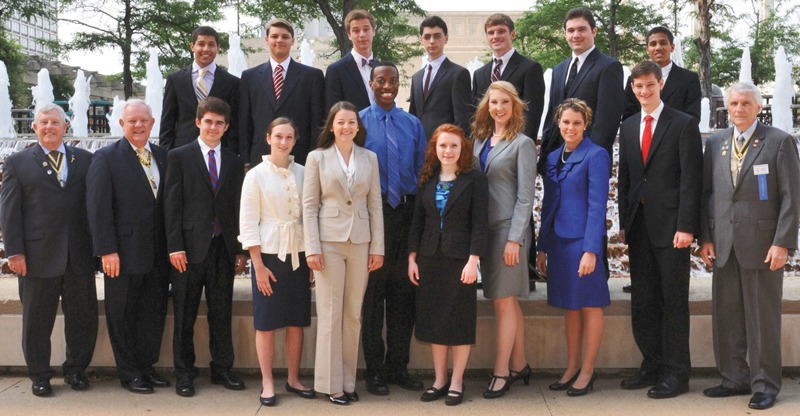Chaplains and the Revolutionary War By Chaplain General Reverand David J. Felts SAR Magazine Summer…
Why Our Right to Privacy Insures National Security
By Taryn P. Murphy
Winner, Joseph S. Rumbaugh Orations Contest 2017
SAR Magazine
Summer 2017 Vol. 112 No. 1
Three loud bangs reverberate on the door. A group of men shatter the lock, bursting in without hesitation. Over the course of four
frightening hours the uniformed intruders overturn furniture, break open chests and boxes, and scour private papers, leaving with arms full of confiscated property and a home left in ruins. Sound like a band of pirates? Think again. These men were royal officers of the British King in 1762, ordered to search the home of John Entick, a man whose only crime was writing pamphlets opposing the British government.

Participants in the Joseph S. Rumbaugh Orations Contest, were, from left: Sumaya Tabbah (Michigan), Indya Rennie (Delaware), Yael Hamburger (Maryland), Kelly Shepperson (Virginia), Linda Martinez (Mississippi), President General J. Michael Tomme, second runner-up Rachel Mallett (Florida), Rebekah R. Doane (Indiana), Ryan Lanford (North Carolina), winner Taryn Murphy (California), Samuel Ryan Day (Kansas), Master of Ceremonies Larry McKinley; back row, Co-Chairman John Franklin, Triston Ferguson (Texas), Larry “Trey” Richard Sprouse (Tennessee), Christina Lilly Hubbell (Louisiana), Joseph Koffell (Washington), Leeann Meyers (Alabama), Jackson “Jack” Stephen Ross-Pilkington (New York), Alexandra Jaouiche (South Carolina), runner-up Isaiah Paik (Ohio), Alexander J. Shura (Illinois), Co-Chairman Jack Bredenfoerder.
When our founding fathers penned the Constitution, they were quite familiar with the intrusiveness of the British Crown and its outright violations of its citizens’ privacy. Crafting the 4th amendment, our founders sought to ensure our homes would remain a safe haven. Today, as technology and government power begin to obscure the original intent of the 4th amendment, it is more important than ever to review the history surrounding the amendment and its significance today as we seek a balance between National Security and privacy right.
It was because our forefathers so valued the privacy of the individual that they established the 4th amendment to the Constitution, which
protects the right of the people to be secure in their persons, houses, papers, and effects against unreasonable searches and seizures. The 4th amendment was adopted as a response to the previous “writs of assistance” of the British government, which fueled the fire for the Revolutionary War. These warrants granted British officers the legal right to search lands or homes without assuming responsibility for damage. In the First United States Congress, the man responsible for proposing the 4th amendment in 1789 was James Madison, who wished for the rights of the people to be secured on a sweeping federal level.
Over time however, the 4th amendment has been eroded as the government justifies more searching capabilities in the name of “homeland security.” Following the terror of 9/11, Congress quickly passed the Patriot Act, which allowed governmental agencies roving surveillance and
the ability to delay notification of search warrants until after the searches were conducted. Edward Snowden’s recent disclosures regarding NSA surveillance programs have raised even more concerns about our government’s interpretation of the 4th amendment, as these anti-terror programs have been revealed to be gathering large swaths of metadata on ordinary Americans’emails, phone calls, and internet activities. Law enforcement officials justify this level of monitoring by saying it is necessary to prevent future terrorism.
Are they right? Is it necessary to sacrifice our constitutional protections for the sake of our national security? As unlikely as it may seem, our founders crafted the 4th amendment so that privacy would actually help to protect, not undermine, our national security. How? Well, the 4th amendment above all protects us from losing our republic and freedoms to a domestic tyrannical government with unchecked free rein to monitor its citizens. We need only look to Pakistan, a nation that has taken its national security efforts to an extreme. Pakistan’s intelligence agencies have long abused their surveillance powers, shamelessly spying on opposing politicians, Supreme Court judges, journalists, lawyers and activists. These extensive measures are meant to combat terror attacks by the Taliban, but instead of feeling protected, the Pakistani people live in constant fear of their government’s power. According to one Pakistani journalist, “Our daily lives are open to unwarranted and unpreventable intrusion.” Pakistan has sacrificed the privacy and freedoms of its people, and consequently weakened its citizens and soil. James Madison wisely cautioned Americans against the most egregious form of tyranny, stating, “The means of defense against foreign danger historically have become the instruments of tyranny at home.”
As we actively fight a war on terror, never before have we seen such a divide between our freedoms and our protection. Here in America, it is possible to uphold our Constitution, which our ancestors fought and died to secure, while still remaining a protected nation. One way to insure that our civil liberties are not compromised further is by allowing more independence to the Privacy and Civil Liberties Oversight Board, a watchdog agency tasked with reviewing government activity relating to foreign intelligence gathering. We must be ever vigilant as Americans. I believe the words of Ronald Reagan aptly summarize the issue: “The kind of government that is strong enough to give you everything you need is also strong enough to take away everything you have.”
